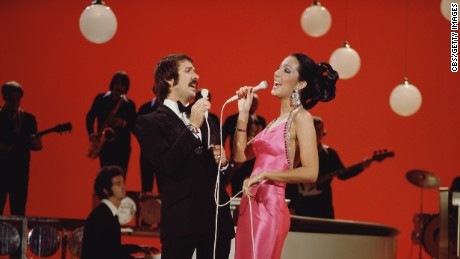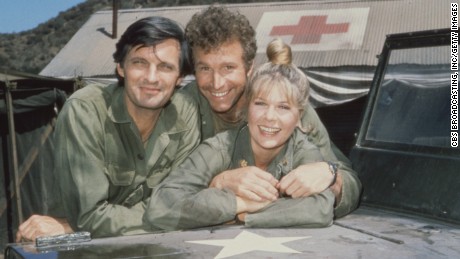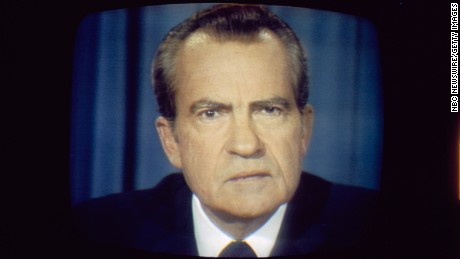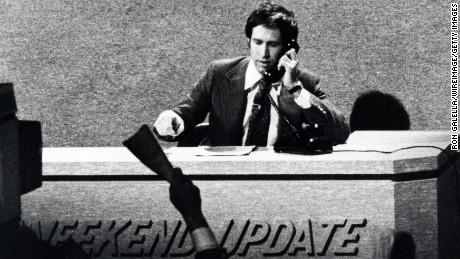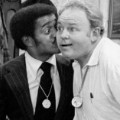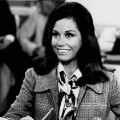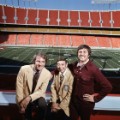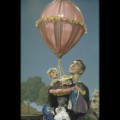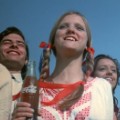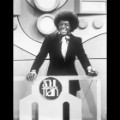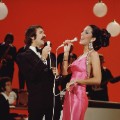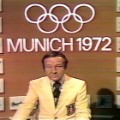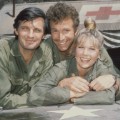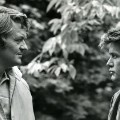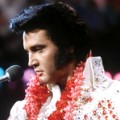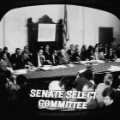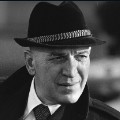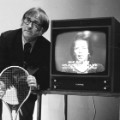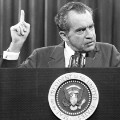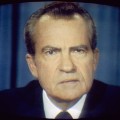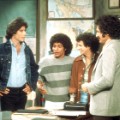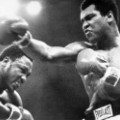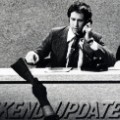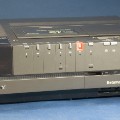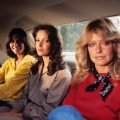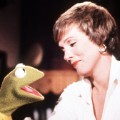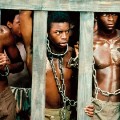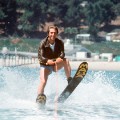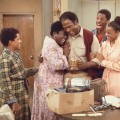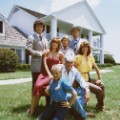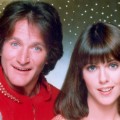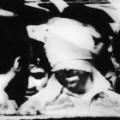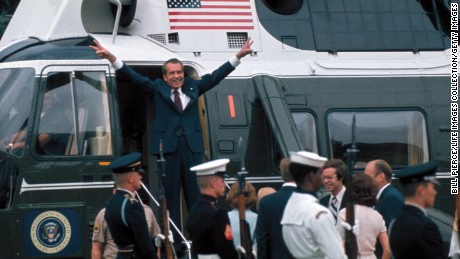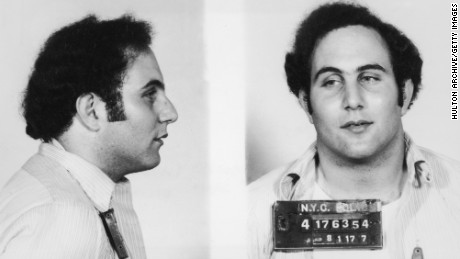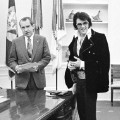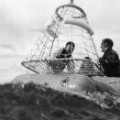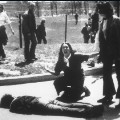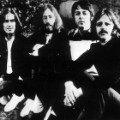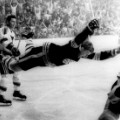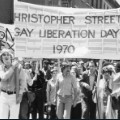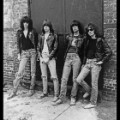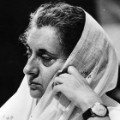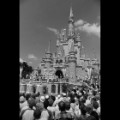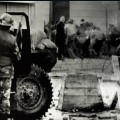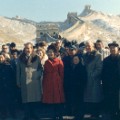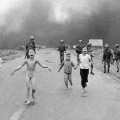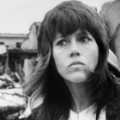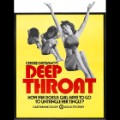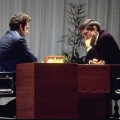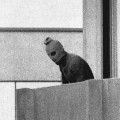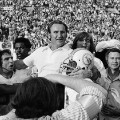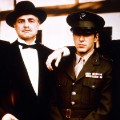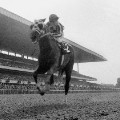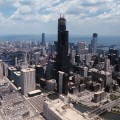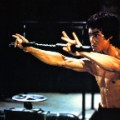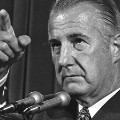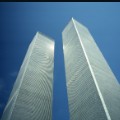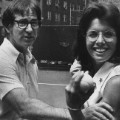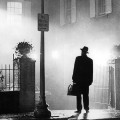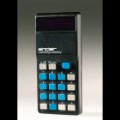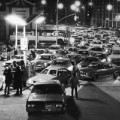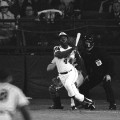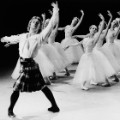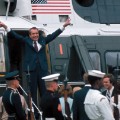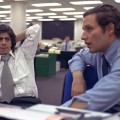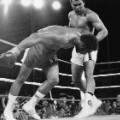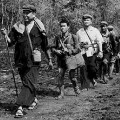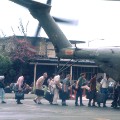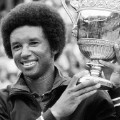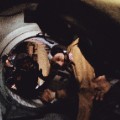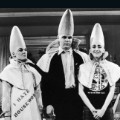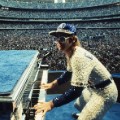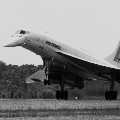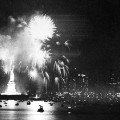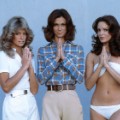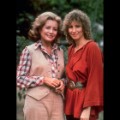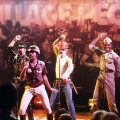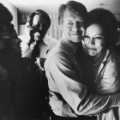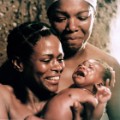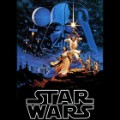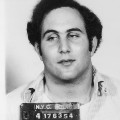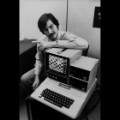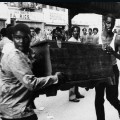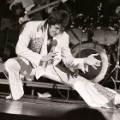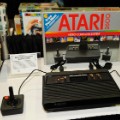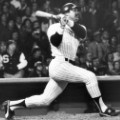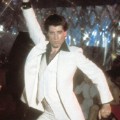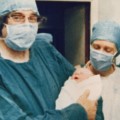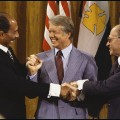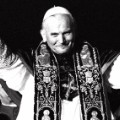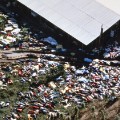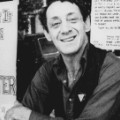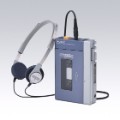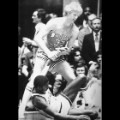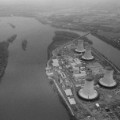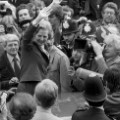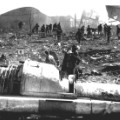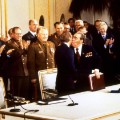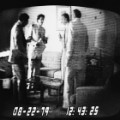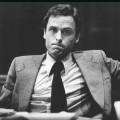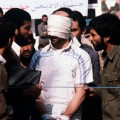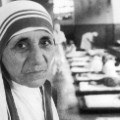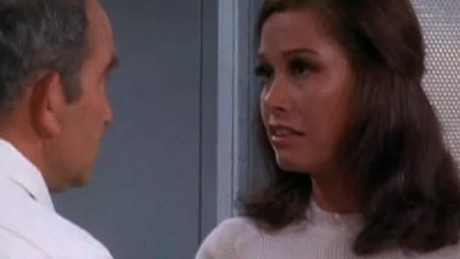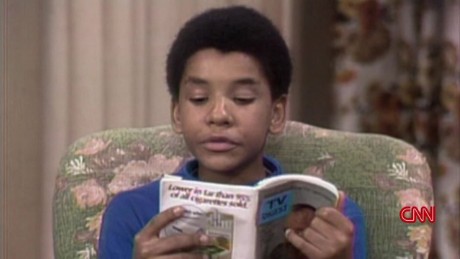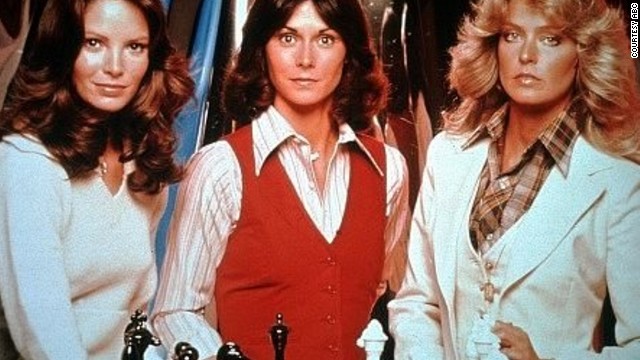70 historic moments from the 1970s
70 historic moments from the 1970s
Apollo 13 returns safely to Earth – The Apollo 13 spacecraft was intended to be the third landing on the moon, but the NASA crew aborted its mission after an oxygen tank exploded on board. The astronauts landed in the South Pacific on April 17, 1970. Here, lunar module pilot Fred W. Haise Jr. is about to be hoisted up to a recovery helicopter from the USS Iwo Jima.
70 historic moments from the 1970s
Kent State massacre – Four students died and nine others were wounded on May 4, 1970, when members of the Ohio National Guard opened fire on students protesting the Vietnam War at Kent State University in Ohio. In this Pulitzer Prize-winning photo, taken by Kent State photojournalism student John Filo, Mary Ann Vecchio can be seen screaming as she kneels by the body of slain student Jeffrey Miller.
70 historic moments from the 1970s
The Beatles call it quits – The "Fab Four," pictured here in 1970, released their final album, "Let It Be," on May 8, 1970. The album came one month after Paul McCartney announced the group's breakup.
70 historic moments from the 1970s
'Flying Bobby' – In one moment, Bobby Orr became a hockey legend. On May 10, 1970, Orr scored an overtime goal in Game 4 of the Stanley Cup Finals, giving the Boston Bruins their first championship since 1941. In 1971, Orr signed the first million-dollar contract in NHL history -- $200,000 a year for five years -- and in 1979 he became the youngest NHL Hall of Famer when he was inducted at the age of 31.
70 historic moments from the 1970s
Gay rights movement gains popularity – Gay rights activists Foster Gunnison and Craig Rodwell lead a gay rights march in New York on June 28, 1970, then known as Gay Liberation Day. The march was held on the first anniversary of the police raid of the Stonewall Inn, a popular gay bar in New York's Greenwich Village. The raid led to demonstrations and protests by the gay community. The Stonewall riots helped bring together the gay community in New York, and by 1971 gay rights groups had formed in almost all of the major cities in America.
70 historic moments from the 1970s
'Hey! Ho! Let's go!' – The '70s ushered in a new musical movement that put a premium on speed, simplicity and raw power. Bands like the Ramones, pictured, and the Sex Pistols put to waste the trippy, hippie music of the '60s, replacing it with short, fast songs filled with attitude and angst. It could only be called one thing: punk.
70 historic moments from the 1970s
Indira Gandhi re-elected – Indira Gandhi, the only woman to ever hold the office of Prime Minister of India, won a second term in a landslide victory in March 1971. She would be re-elected to a fourth term in 1980, but she was assassinated by two of her bodyguards in 1984.
70 historic moments from the 1970s
Disney World opens – A crowd in Orlando waits for Walt Disney World's Main Street to open in October 1971. The park cost an estimated $400 million to build and now attracts around 25 million visitors annually. When Disney World opened in 1971, the price for admission was $3.50. A single-day ticket now is $105 for anyone over 10 years old.
70 historic moments from the 1970s
'Bloody Sunday' – On January 30, 1972, British soldiers opened fire against protesters in Londonderry, Northern Ireland, who were marching against British rule. Thirteen people were killed on the scene, and more than a dozen were injured. After the shooting, recruitment and support for the Irish Republican Army skyrocketed. Three decades of violence known as The Troubles followed, and almost 3,000 people died.
70 historic moments from the 1970s
Nixon in China – Richard Nixon became the first U.S. President to visit China. His trip in February 1972 was an important step in building a relationship between the two countries.
70 historic moments from the 1970s
'Napalm Girl' – Associated Press photographer Nick Ut photographed terrified children running from the site of a napalm attack during the Vietnam War in June 1972. A South Vietnamese plane accidentally dropped napalm on its own troops and civilians. Nine-year-old Kim Phuc, center, ripped off her burning clothes while fleeing. The image communicated the horrors of the war and contributed to the growing anti-war sentiment in the United States. After taking the photograph, Ut took the children to a hospital.
70 historic moments from the 1970s
70 historic moments from the 1970s
Porn goes mainstream – In any other year it might sound strange, but in 1972 one of the most popular films of the year was a porno. "Deep Throat" was one of the first pornographic films to receive mainstream attention, and it made $3 million in its first six months of release. It also took on an additional layer of cultural significance when the secret informant in the Watergate scandal went by the pseudonym "Deep Throat."
70 historic moments from the 1970s
Cold War chess championship – American Bobby Fischer, right, and Russian Boris Spassky play their last game of chess together in Reykjavik, Iceland, on August 31, 1972. Fischer defeated Spassky to become the World Chess Champion, ending a Soviet win streak that dated to 1948.
70 historic moments from the 1970s
Terror at the Olympics – On September 5, 1972, the Summer Olympics in Munich, Germany, were in the throes of a hostage crisis. Two Israeli athletes had been killed and nine taken hostage by members of Black September, a Palestinian terrorist movement demanding the release of political prisoners by the Israeli government. Hours later, all nine hostages, five terrorists and one police officer were dead.
70 historic moments from the 1970s
The perfect season – The Miami Dolphins, coached by Don Shula, win Super Bowl VII in January 1973 and become the only NFL team in history to win a championship with an undefeated record.
70 historic moments from the 1970s
'I'll make him an offer he can't refuse' – "The Godfather," directed by Francis Ford Coppola, took home several Academy Awards in March 1973, including Best Picture and Best Adapted Screenplay. The film was based on the best-selling novel by Mario Puzo and starred, from left, James Caan, Marlon Brando, Al Pacino and John Cazale. Brando won the Oscar for Best Actor.
70 historic moments from the 1970s
70 historic moments from the 1970s
Chicago's record-setting giant – In 1973, the Sears Tower opened in Chicago, overtaking the World Trade Center as the tallest building in the world. The tower, now known as the Willis Tower, is the second-tallest building in the United States today.
70 historic moments from the 1970s
Bruce Lee dies – Martial-arts actor Bruce Lee, seen here training in a scene from the film "Enter the Dragon," dies in July 1973 just days before the movie's release. He was 32. The film would cement Lee's legend and bring martial arts to the forefront of pop culture.
70 historic moments from the 1970s
Scandal in the Nixon administration – U.S. Vice President Spiro T. Agnew addresses the media on August 8, 1973, saying he would not resign while being investigated on charges of tax fraud, bribery and conspiracy. However, Agnew resigned in October 1973 after pleading no contest to a single count of income-tax evasion. He was the second vice president to resign in U.S. history.
70 historic moments from the 1970s
The 'Twin Towers' – From the time of their completion in 1973 until their destruction in the terror attacks of September 11, 2001, The World Trade Center's twin towers stood as an iconic part of the New York City skyline.
70 historic moments from the 1970s
'Battle of the Sexes' – In a nationally televised tennis match on September 20, 1973, Bobby Riggs, a former No. 1 tennis player, took on Billie Jean King, one of the top female tennis players at the time. Earlier in the year, Riggs put out a challenge to all female tennis players, saying no woman could beat him. King beat Riggs 6-4, 6-3, 6-3 and claimed a $100,000 prize.
70 historic moments from the 1970s
'The Exorcist' hits theaters – "The Exorcist," based off the best-selling novel by William Peter Blatty about a demonically possessed 12-year-old girl, was released in December 1973. It went on to become one of the most popular films of all time. It was the first horror film to be nominated for a Best Picture Oscar, and Blatty won the Academy Award for Best Adapted Screenplay.
70 historic moments from the 1970s
The pocket calculator – By 1973, Clive Sinclair had introduced a series of pocket calculators that changed the industry, making calculators small and light enough to fit in your pocket. They were not only much smaller and thinner than their competitors, but also much cheaper, making their advanced technology available to the masses.
70 historic moments from the 1970s
Energy crisis – Cars in Brooklyn, New York, line up for gas in January 1974. In October 1973, an oil embargo imposed by members of OPEC led to skyrocketing gas prices and widespread fuel shortages.
70 historic moments from the 1970s
Hammerin' Hank – Hank Aaron breaks Babe Ruth's career home run record, hitting home run No. 715 at Atlanta's Fulton County Stadium in April 1974. Aaron finished his career with 755 home runs, a record that stood until Barry Bonds broke it in 2007.
70 historic moments from the 1970s
Baryshnikov defects – Russian dancer Mikhail Baryshnikov, left, tapes a TV special in Canada, where he defected in June 1974. Soon after, Baryshnikov moved to the United States and started working with the New York City Ballet and the American Ballet Theatre. In 1979, he earned an Academy Award nomination for his supporting role in the film "The Turning Point."
70 historic moments from the 1970s
Nixon resigns – U.S. President Richard Nixon gestures in the doorway of a helicopter on August 9, 1974, after leaving the White House following his resignation over the Watergate scandal. Nixon's resignation marked the end to one of the biggest political scandals in U.S. history, which began in 1972 after a break-in at the Democratic National Committee's headquarters at the Watergate complex. Five men were arrested for the burglary, and the FBI and Washington Post reporters Bob Woodward and Carl Bernstein were able to trace them back to Nixon and the White House.
70 historic moments from the 1970s
Power of the press – Reporters Bob Woodward, right, and Carl Bernstein sit in the newsroom of the Washington Post newspaper in May 1973. Woodward and Bernstein's reporting on the Watergate scandal led to President Nixon's resignation and won them a Pulitzer Prize. In 1976, Robert Redford and Dustin Hoffman would portray the pair in the film adaptation of their book "All the President's Men."
70 historic moments from the 1970s
Cover girl – Beverly Johnson made history in August 1974 when she became the first African-American model to appear on the cover of Vogue magazine in the United States.
70 historic moments from the 1970s
Muhammad Ali watches heavyweight champion George Foreman fall to the canvas during their title bout in Kinshasa, Zaire, in October 1974. Ali's upset victory over the undefeated Foreman won him back the titles he was stripped of in 1967 for refusing induction into the U.S. Army.
70 historic moments from the 1970s
Cambodian genocide – From 1975-1979, Pol Pot -- seen here at far left -- led the Khmer Rouge communist movement in Cambodia. During his reign, at least 1.7 million people -- nearly a quarter of Cambodia's population -- died from execution, disease, starvation and overwork, according to the Documentation Center of Cambodia.
70 historic moments from the 1970s
The fall of Saigon – In April 1975, the fall of Saigon to the North Vietnamese effectively marked the end of the Vietnam War. Here, U.S. Marines guard civilians during evacuations at Tan Son Nhut airbase. The country became the Socialist Republic of Vietnam on July 2, 1976.
70 historic moments from the 1970s
70 historic moments from the 1970s
Arthur Ashe wins Wimbledon – American tennis player Arthur Ashe became the first black man to win Wimbledon when he defeated Jimmy Connors in July 1975. Ashe retired from tennis in 1980 and became a spokesperson for HIV and AIDS after announcing he had contracted HIV from a blood transfusion. Ashe died on February 6, 1993, from AIDS-related pneumonia.
70 historic moments from the 1970s
Commander of the Soviet crew of Soyuz, Alexei Leonov, left, and commander of the American crew of Apollo, Thomas Stafford shake hands July 17, 1975 in space, somewhere over Western Germany, after the Apollo-Soyuz docking maneuvers.
70 historic moments from the 1970s
'Not ready for Prime Time' – Saturday night television changed forever on October 11, 1975, when the sketch comedy show "Saturday Night Live" made its debut. Comedian George Carlin was the first host, joining a cast of young and upcoming comics known as "The Not Ready for Prime Time Players." "SNL" is now in its 40th year as one of the longest running shows in television history.
70 historic moments from the 1970s
Dazzling Elton – English singer Elton John, one of the biggest artists of the '70s, performed two sold-out shows at Los Angeles' Dodger Stadium in October 1975, performing for more than three hours each night. John, known for his flamboyant outfits and oversized sunglasses, was decked out for the occasion in a sequined Dodgers baseball uniform.
70 historic moments from the 1970s
The Concorde takes off – It broke the sound barrier and cut flight times in half. On January 21, 1976, the first commercial Concorde flight took place from London to Paris, cruising at speeds of 1,350 mph. The Concordes' flights would be short lived, however, as fewer than 20 ever saw commercial use. The last commercial Concorde flight took place on October 24, 2003.
70 historic moments from the 1970s
Happy 200th birthday, America! – Fireworks at the Statue of Liberty light up the New York Harbor on July 4, 1976, as the country celebrates the bicentennial anniversary of the Declaration of Independence. Patriotic events took place around the country that year.
70 historic moments from the 1970s
'Angels' flying high – On September 22, 1976, a blonde bombshell dropped into America's homes with the debut of the television show "Charlie's Angels." Farrah Fawcett and co-stars Kate Jackson and Jaclyn Smith became an instant hit with audiences. To this day the show remains a lasting image of the 70s despite getting mixed reviews from critics.
70 historic moments from the 1970s
Barbara becomes the news – In October 1976, Barbara Walters, seen at left with actress Barbra Streisand, became the first woman to co-anchor a major network evening newscast. ABC made history before she even went on air, signing Walters to a $1 million annual contract to make her the highest-paid journalist at that time. She only co-anchored the show for a year and a half, but she would go on to host ABC shows such as "20/20," "The View" and "Barbara Walters Specials" until her retirement in 2014.
70 historic moments from the 1970s
Disco ruled the charts in the late '70s but found some unlikely superstars in the form of the Village People. Their name was inspired by New York's Greenwich Village, which had a large gay population at the time, and the group became known for their onstage costumes and suggestive lyrics. In 1978, their songs "Macho Man" and "Y.M.C.A." became massive hits and brought them mainstream success.
70 historic moments from the 1970s
From peanut farmer to President – Jimmy Carter embraces his wife, Rosalynn, in November 1976 after he was elected as the 39th President of the United States. Carter, a Democrat and former governor of Georgia, defeated incumbent Gerald Ford. During his time in office, Carter created the Department of Energy and Department of Education. Since leaving the office in 1980, he has remained active in fighting for human rights and ending disease around the world with his nonprofit organization, the Carter Center.
70 historic moments from the 1970s
'Roots' premieres – Cicely Tyson, left, and Maya Angelou star in the television miniseries "Roots." The series premiered in January 1977, airing for eight consecutive nights and attracting a record number of viewers. Based off Alex Haley's novel, "Roots" told the story of an African boy sold into slavery in America and the following generations of his family. The show was viewed by more than half of the U.S. population in 1977, and it received 37 Emmy nominations.
70 historic moments from the 1970s
'In a galaxy far, far away' – May 25, 1977, was a historic day for sci-fi fans and moviegoers everywhere. George Lucas' "Star Wars" opened in theaters, introducing the world to characters such as Luke Skywalker, Chewbacca, R2D2 and, of course, Darth Vader. The "Star Wars" franchise is still one of most lucrative and popular film series around today.
70 historic moments from the 1970s
Son of Sam – Serial Killer David Berkowitz, known as the Son of Sam, was arrested on August 10, 1977, after a series of shootings and murders that police believe began in the summer of 1976. Berkowitz was convicted of killing six people and wounding seven during his crime spree, which garnered large amounts of press coverage. He was known for targeting young women and sending cryptic, antagonizing letters to the New York police.
70 historic moments from the 1970s
Apple plants the seed for the digital revolution – In 1977, Apple Computers introduced the Apple II, which became one the first successful home computers. Co-founders Steve Jobs, pictured here, and Steve Wozniak formed the Apple Computer Company in 1976. Along with Bill Gates' Microsoft, which was founded in 1975, Apple helped ignite the digital age we live in today.
70 historic moments from the 1970s
New York City goes dark – In the middle of the summer of 1977, New York City experienced a power outage that caused much of the city to go dark. The blackout lasted two days, from July 13-14. As the city was in the midst of a financial crisis and the terror of the Son of Sam loomed over residents, many took to the streets and began looting. Police reported that looting in some areas of the city continued well into the daylight hours, and thousands of people were arrested.
70 historic moments from the 1970s
The King is dead – Elvis Presley, the King of Rock 'n' Roll, died August 16, 1977, at the age of 42. He was still touring and recording throughout the 1970s, but his unexpected death sealed his legacy as one of the greatest cultural icons of the 20th century.
70 historic moments from the 1970s
Game on – The Atari 2600 was released in September 1977, bringing the world of video games into households everywhere. Packaged with two joystick controllers and one cartridge game, the Atari 2600 sold 250,000 units in 1977. By 1979, 1 million units were sold. What some believed at the time to be a fad has now turned into a billion-dollar-a-year industry.
70 historic moments from the 1970s
Mr. October – Reggie Jackson of the New York Yankees hits his third home run of the game on October 18, 1977, leading the Yankees to a World Series win over the Los Angeles Dodgers. Jackson had a .357 batting average over the 27 World Series games throughout his career, earning him the nickname "Mr. October." Jackson and the Yankees would repeat as World Series champions the following year.
70 historic moments from the 1970s
Disco fever – Disco music sweeps the nation with the 1977 film "Saturday Night Fever" starring John Travolta. Catapulted by a soundtrack containing five No. 1 singles -- including "Staying Alive" and "Night Fever" -- the film became a huge commercial success. The soundtrack stayed on top of the album charts for six months, and Travolta earned an Academy Award nomination for Best Actor.
70 historic moments from the 1970s
A test tube produces life – Louise Brown became the world's first test-tube baby on July 25, 1978. Dr. Robert Edwards, left, and Patrick Steptoe, right, pioneered the process of in vitro fertilization, which injects a single sperm into a mature egg and then transfers the egg into the uterus of the woman. In 2010, Edwards won the Nobel Prize in Medicine for the development of in vitro fertilization, which has helped families conceive more than 5 million babies around the world.
70 historic moments from the 1970s
Peace in the Middle East – Egyptian President Anwar Sadat, left, joins hands with Israeli Prime Minister Menachem Begin, right, on September 18, 1978, after the Camp David Accords were signed in Maryland. After 12 days of secret meetings, the two sides agreed upon a step toward peace. U.S. President Jimmy Carter, center, personally led the lengthy negotiations and discussions between the two parties.
70 historic moments from the 1970s
The world welcomes a new Pope – His name was Karol Jozef Wojtyla, but the world knew him as Pope John Paul II. Born in Poland, John Paul II was the first non-Italian Pope in more than in 400 years when he became Pope in 1978. He made his first public appearance on October 16, 1978, at St. Peter's Square in the Vatican, and before his death in 2005 he was beloved for his commitment to human rights around the world.
70 historic moments from the 1970s
70 historic moments from the 1970s
The Jonestown massacre – Bodies lie around the compound of the People's Temple in Jonestown, Guyana, on November 18, 1978. More than 900 members of the cult, led by the Rev. Jim Jones, died from cyanide poisoning; it was the largest mass-suicide in modern history.
70 historic moments from the 1970s
Assassination of Harvey Milk – In 1977, Harvey Milk was elected to the San Francisco Board of Supervisors, making him the first openly gay person to be elected to a public office. Milk started his political ambitions in San Francisco in the early '70s, but he did not hold an office until he was appointed to the Board of Permit Appeals in 1976 by Mayor George Moscone. Milk's career was tragically cut short on November 27, 1978, when he and Moscone were assassinated.
70 historic moments from the 1970s
Music goes mobile – The sound barrier is broken once again in the '70s, but this time at walking speed. Sony introduces the Walkman, the first commercially successful "personal stereo." Its wearable design and lightweight headphones gave listeners the freedom to listen to music privately while out in public. The product was an instant hit. The Walkman was a mark of coolness among consumers, setting a standard for future generations of personal devices like the Apple iPod.
70 historic moments from the 1970s
Magic vs. Bird – The 1979 national championship game between Michigan State and Indiana State still ranks as the most-watched college basketball game of all time, thanks to two up-and-coming superstars: Michigan State's Earvin "Magic" Johnson, bottom, and Indiana State's Larry Bird. Johnson's Spartans won the NCAA title, but the two players' rivalry was only just beginning. During their pro careers in the NBA, Bird's Boston Celtics and Johnson's Los Angeles Lakers would meet in the NBA Finals three times in the '80s.
70 historic moments from the 1970s
Three Mile Island – On March 28, 1979, the worst nuclear accident in U.S. history took place in Pennsylvania when large amounts of reactor coolant and radioactive gases from the Three Mile Island power plant were released into the environment. Within days of the accident, 140,000 people evacuated their homes within a 20-mile radius of the plant. The accident brought widespread attention to reactor safety and large protests from anti-nuclear groups. Cleanup from the accident began in August 1979 and was not completed until December 1993.
70 historic moments from the 1970s
The Iron Lady – Margaret Thatcher celebrates her first election victory, becoming Britain's first female Prime Minister on May 4, 1979. As leader of the Conservative Party, Thatcher served three terms as Prime Minister, holding the office until 1990. That made her the longest-serving British Prime Minister of the 20th century.
70 historic moments from the 1970s
Deadliest day in U.S. aviation – Only moments after takeoff, an engine separated from American Airlines Flight 191, causing the plane to crash in a field near Chicago's O'Hare International Airport on May 26, 1979. All 271 people on board the plane -- and two people on the ground -- were killed, making it the worst aviation accident ever on U.S. soil.
70 historic moments from the 1970s
SALT II – The Strategic Arms Limitation Talks, otherwise known as SALT, were a series of meetings and treaties designed at limiting and keeping track of the missiles and nuclear weapons carried by the United States and the Soviet Union. The first treaty was signed in 1972, and the second one was signed in 1979. Six months after the second signing, however, the Soviet Union invaded Afghanistan, and the United States never ratified the SALT II agreement.
70 historic moments from the 1970s
An 'American Hustle' – Scandals shaped a large part of the '70s political atmosphere, and the decade ended on a big one. During a two-year investigation, the FBI set up a sting operation dubbed "Abscam," videotaping politicians accepting bribes from a phony Arabian company in return for favors. The sting resulted in the conviction of six U.S. representatives, one senator, a mayor from New Jersey and members of the Philadelphia City Council. The operation was the inspiration for David O. Russell's 2013 film "American Hustle."
70 historic moments from the 1970s
From Boy Scout to murderer – Ted Bundy, one of the most notorious serial killers of all-time, stands trial in June 1979 for two of his many murders. Bundy received three death sentences for murders he committed in Florida, and he was executed on January 24, 1989. Bundy confessed to 30 murders before his death, but officials believe that number could be higher.
70 historic moments from the 1970s
70 historic moments from the 1970s
A living saint – Agnes Gonxha Bojaxhiu, or "Mother Teresa," won the Nobel Peace Prize in 1979 for dedicating her life to helping the poor. Her foundation in Kolkata, India, "The Missionaries of Charity," took care of orphans, the sick and elderly. In 2003, she was beatified.








